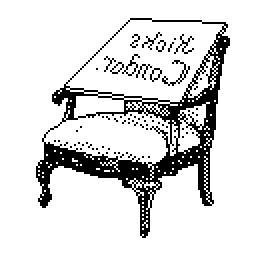
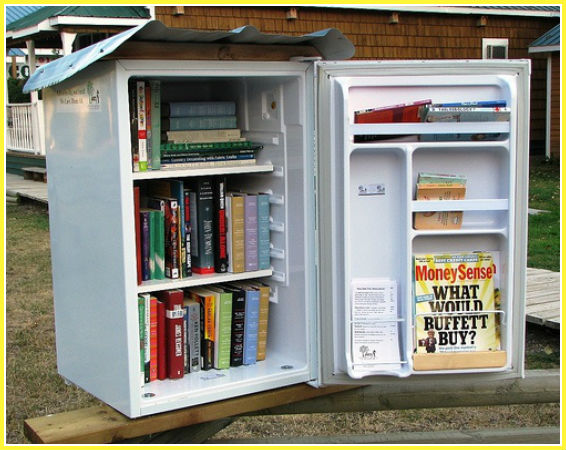
Foundations of a Tiny Directory
Can the failing, impotent web directory be transformed? Be innovated??
Can we still innovate on the humble web directory? I don’t think you can view large human-edited directories (like Yahoo! or DMOZ) as anything but a failure when compared to Google. Sure, they contained millions of links and, ultimately, that may be all that matters. But a human editor cannot keep up with a Googlebot! So Google’s efficiency, speed and exhaustiveness won out.
But perhaps there is just no comparison. Perhaps the human-edited directory still has its strengths, its charms. After all, it has a human, not a GoogleBot. Could a human be a good thing to have?
An Age of Link Fatigue
We now have an abundance of blogs, news, podcasts, wikis—we have way too much really. Links constantly materialize before your very eyes. Who would even begin, in 2018, to click on Yahoo!'s “Social Science” header and plumb its depths?
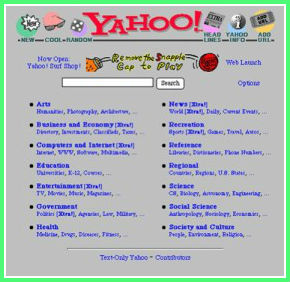
Strangely enough, even Wikipedia has a full directory of itself, tucked in a corner. (Even better, there’s a human-edited one hidden in there! Edit: Whoa! And the vital articles page!) These massive directories are totally overwhelming and, thus, become more of an oddity for taking a stroll. (But even that—one usually begins a stroll through Wikipedia with a Google search, don’t they?)
The all-encompassing directory found another way: through link-sharing sites like Del.icio.us and Pinboard. If I visit Pinboard’s botany tag, I can see the latest links—plant of the week the “Night Blooming Cereus” and photos of Mount Ka’ala in Hawaii. Was that what I was looking for? Well at least I didn’t have to find my way through a giant hierarchy.
Where directories have truly found their places is in small topic-based communities. Creepypasta and fan site wikis have kept the directory alive. Although, hold up—much like Reddit’s sub-based wikis—these mostly store their own content. The Boushh page mostly links back to the wiki itself, not to the myriad of essay, fan arts and video cosplays that must exist for this squeaky bounty hunter.
Besides—what if a directory wasn’t topic-based? What if, like Yahoo!, the directory attempted to tackle the Whole Web, but from a specific viewpoint?
Craft Librarians on the Web
You see this in bookstores: staff recommendations. This is the store’s window into an infinite catalog of books. And it works. The system is: here are our favorites. Then, venturing further into the store: this is what we happen to have.
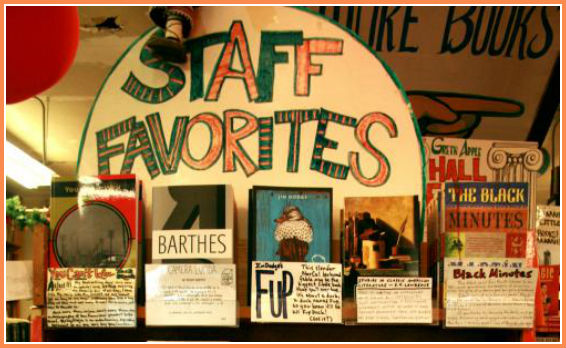
“But I want what I want,” you mutter to yourself as you disgustedly flip through a chapbook reeking of hipster.
Well, of course. You’re not familiar with this store. But when I visit Green Apple in San Francisco, I know the store. I trust the store. I want to look through its directory.
This has manifested itself in simple ways like the blogroll. Two good examples would be the Linkage page on Fogus.me, which gives short summaries, reminiscent of the brief index cards with frantic marker all over them. This is the staff recommendation style blogroll.
Another variation would be Colin Walker’s Directory, which collects all blogs that have sent a Webmention[1]. This serves a type of “neighborhood” directory.[2]
What I want to explore now is the possibility of expanding the blogroll into a new kind of directory.
Social Linking
Likes, upvotes, replies, friending. What if it’s all just linking? In fact, what if linking is actually more meaningful!
When I friend you and you disappear into the number twenty-three—my small collection of twenty-three friends—you are but a generic human, a friendly one, maybe with a tiny picture of you holding a fishing rod. With any luck, the little avatar is big enough that I can discern the fishing rod, because otherwise, you’re just a friendly human. And I’m not going to even attempt to assign a pronoun with a pic that small.
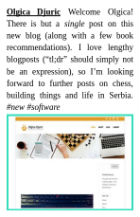
It’s time for me to repeat this phrase: Social Linking. Yes, I think it could be a movement! Just a small one between you and I.
It began with an ‘href hunt’: simply asking anyone out there for links and compiling an initial flat directory of these new friends. (Compare in your mind this kind of treatment of ‘friends’ to the raw name dumps we see on Facebook, et al.) How would you want to be linked to?
Now let’s turn to categories. A small directory doesn’t need a full-blown hierachy—the hierarchy shouldn’t dwarf the collection. But I want more than tags.
---
Link Title
url://something/something
*topic/subtopic format time-depth
Markdown-formatted *description* goes here.
Ok, consider the above categorization structure. I’m trying to be practical but multi-faceted.
topic/subtopicis a two-level ad-hoc categorization similar to a tag. A blog may cover multiple categories, but I’m not sure if I’ll tackle that. I’m actually thinking this answers the question, “Why do I visit this site? What is it giving me?” So a category might besupernatural/ghostsif I go there to get my fix of ghosts; or, it could bewriting/essaysfor a blog I visit to get a variety of longform. An asterisk would indicate that the blog is a current feature among this topic (and this designation will change periodically.)formatcould be: ‘blog’, ‘podcast’, ‘homepage’, a single ‘pdf’ or ‘image’, etc.time-depthindicates the length one can expect to spend at this link. It could be an image that only requires a single second. It could be a decade worth of blog entries that is practically limitless.
The other items: author, url and description—these are simply metadata that would be collected.
The directory would then allow discovery by any of these angles. You could go
down by topic or you could view by ‘time depth’. I may even nest these structures
so that you could find links that were of short time depth under supernatural/ghosts.
The key distinct between this directory and any other would be: this is not a collection of the “best” links on the Web—or anywhere near an exhaustive set of links. But simply my links that I have discovered and that I want to link to.
I don’t know why, but I think there is great promise here. Not in a return to the old ways. Just: if anyone is here on the Web, let’s discover them.
I should also mention that many of the realizations in this post are very similar to Brad’s own Human Edited vs. Google post, which I cite here as an indication that this topic is currently parallelized. ↩︎

